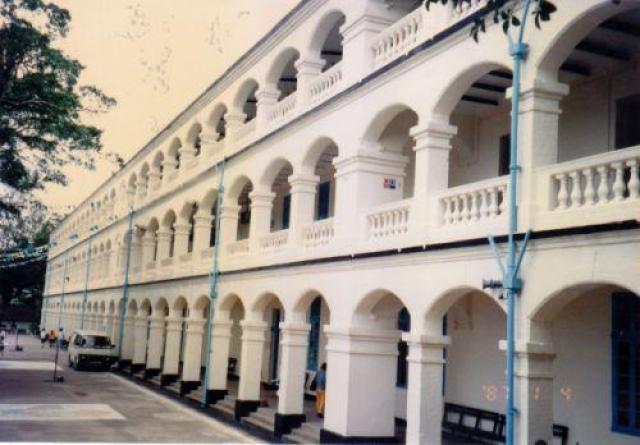The old Lei Yue Mun Barracks was one of the earliest and most important British Army fortifications in Hong Kong. Situated at the northeast corner of Hong Kong Island overlooking the eastern approach to the Victoria Harbour, Lei Yue Mun occupied a strategic position. In 1885, the military decided to construct a permanent infrastructure at Lei Yue Mun. In 1889, land was transferred to the War Department for constructing barracks at Lei Yue Mun. The Barracks consisted of the central area (main barracks), the western ridge (upper fort) and the headland (lower fort). The main barracks, built at different times from 1890 to 1939, mainly served as offices and married quarters for the British Army. By the 1890s, the fortifications at Lei Yue Mun had fully become an important point of coastal defence and continued to expand in the following decades.
By the 1930s, the strategic importance of Lei Yue Mun had declined considerably as a result of technological and tactical advances. On 19 December 1941, the Barracks fell to the hands of the Japanese in the Battle of Hong Kong. In the post-war period, the Barracks was used by the British Army as a training ground until 1987, after which the Barracks was returned to the Hong Kong Government for civil use. The central area and the western ridge have become the Lei Yue Mun Park and Holiday Village since 1988, whereas the military installations at the headland were restored to form the Museum of Coastal Defence which was opened in 2000.
Block 10 was built in 1890 to 1895 with an extension added in 1935. The older part is believed to be one of the earliest buildings constructed in the first phase of the barracks development. It occupies a commanding site towards the north. It was originally built as soldiers quarters for the Royal Artillery.
Block 10 is probably the most elegant building in the Barracks and a rare piece of simplified Classical design architecture. It is a three-storey long rectangular building featuring open arched, colonnaded and balustraded verandahs on the front and rear facades. The segmental arches are supported on square Tuscan order columns. The first and second floor verandahs have classical urn-shaped balustrading. The extension in 1935 was generally constructed to the same scale and to the same design as the older block. The chimneys and most of the fireplaces still exist.
Block 10 of the old Lei Yue Mun Barracks was declared a monument in 2016.
